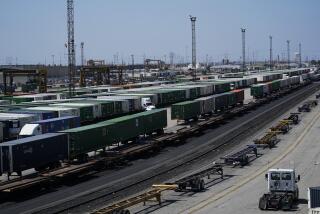Court Action Possible Over Train Whistles
- Share via
Placentia officials Wednesday warned that they will seek a court injunction to keep train whistles quiet within their boundaries unless negotiations with a railroad freight line result in a satisfactory compromise.
For years, the Burlington Northern & Santa Fe Railway Co. agreed not to blow its whistles through Placentia. But on Sunday, the company dropped what it called its “good neighbor agreement,” which led to train whistles blasting loudly throughout the city limits. Company officials cited new federal safety regulations due later in the year that will require whistle warnings as trains approach intersections.
But following massive residential protests, city officials have told the railroad company that the whistles have to be cut back, at least in the predawn hours.
“We’ve had a very cooperative relationship with Burlington over the years, but if we have to go to court over this, that’s what we’ll do,” said Placentia City Attorney Thomas F. Nixon.
Freight train whistles have always blown in other Southern California cities. But Placentia has long had a “quiet zone” ban on whistles because it has so many crossings near residential areas. The attorney general’s office in 1986 called the ban unenforceable and Amtrak and Metrolink don’t abide by it. But those are daytime trains.
The Burlington line runs trains all night long. Railroad officials informed the city a few weeks ago it would be changing its policy and warned that people should be prepared.
But residents have been so upset about the whistles waking them up at night that they held a rally on Sunday morning to demonstrate. Then Tuesday night, some 700 protesters showed up at the City Council meeting to demand that something be done.
City officials were in agreement.
Councilman Scott P. Brady called Burlington’s whistle resumption “callous” and first brought up the threat of legal action, specifically an injunction to bar the whistle-blowing within city limits.
Residents pleaded for Burlington to at least compromise by not blowing the whistles before dawn.
But railway spokeswoman Lena Kent responded Wednesday: “There will be no compromise.”
Later in the day, however, railway officials agreed to further talks with Placentia city leaders. The city wants the whistles stopped, but short of that, it wants a compromise that would ease public anger.
“I’m hopeful that we can convince them that we’re serious about this, that it’s a major priority for us,” Placentia Mayor Chris Lowe said.
Brady, however, was more emphatic.
“If we have to play hardball, then we’ll do it,” he said. “They have to know we’ll pursue all means necessary to get something done about this. Our residents are upset, and so are we.”
The rail company considers the train whistles an important safety measure, Kent said. Federal studies have shown that 62% more collisions occur at crossings with no whistle warnings. Train conductors blow their whistles--five blasts--approaching intersections in all 28 states Burlington serves, she said.
“We want our policy to be consistent,” she said. “We can’t do that if we blow it some hours but not others.”
The city’s best chance at stopping the whistles, Kent said, was to join a federal pilot program for quiet zones. Under the plan, cities will be exempt from new regulations if they provide supplemental safety features at railroad crossings.
But just what those measures will be hasn’t been determined yet. And it would be well into next year before such features could be in place.
The long-term answer, both sides agree, is a $400-million plan by several northern Orange County cities to depress the tracks 35 feet into the ground, which would preclude a need for train whistles. But that plan is several years away from reality.
Residents such as John Cullum want something done now.
“Our city officials need to know that we just aren’t going to take this,” he said.
More to Read
Sign up for Essential California
The most important California stories and recommendations in your inbox every morning.
You may occasionally receive promotional content from the Los Angeles Times.













